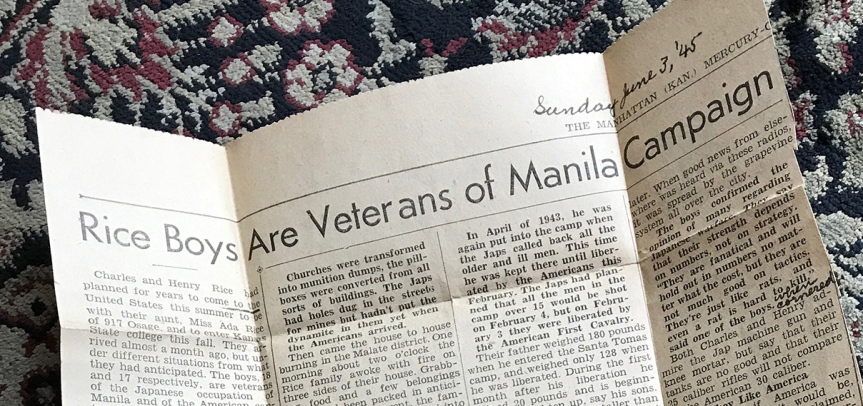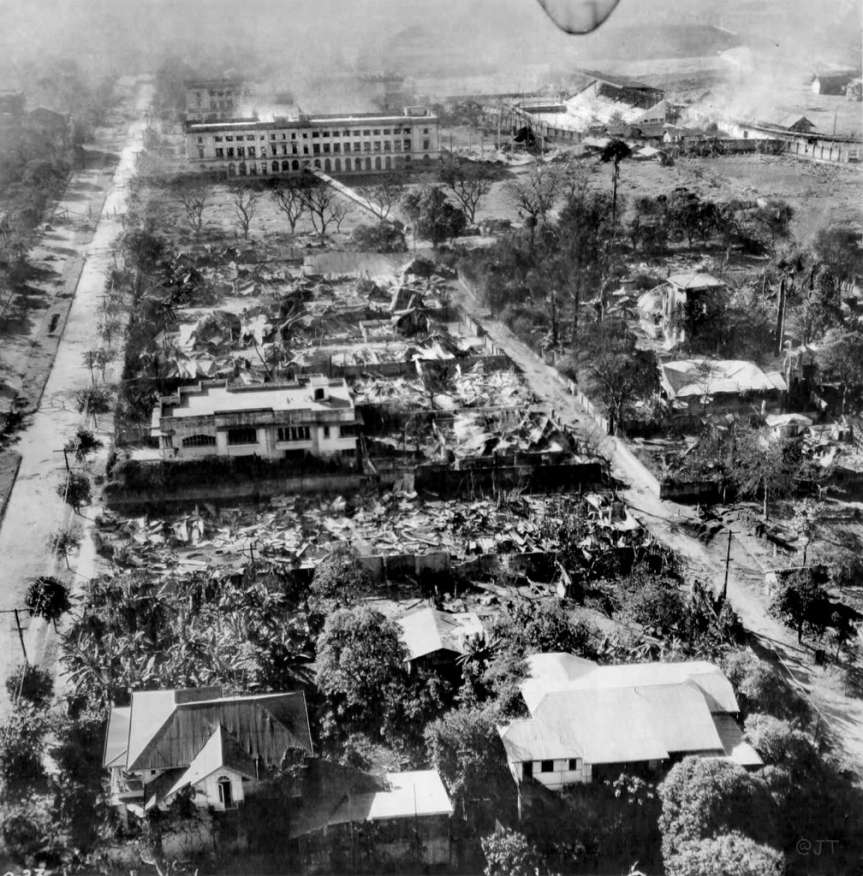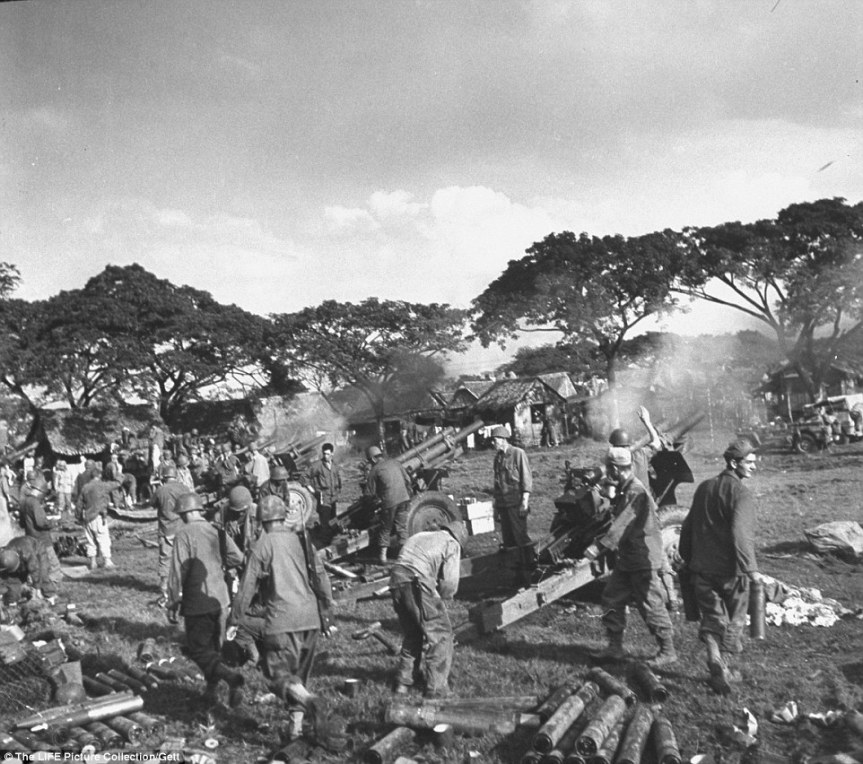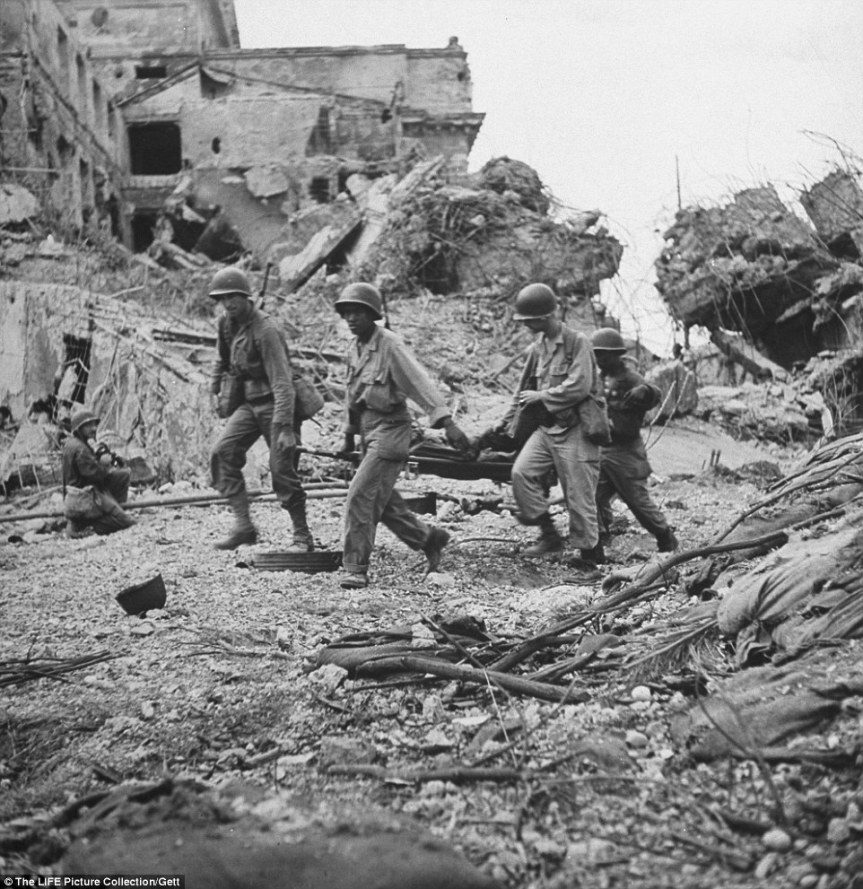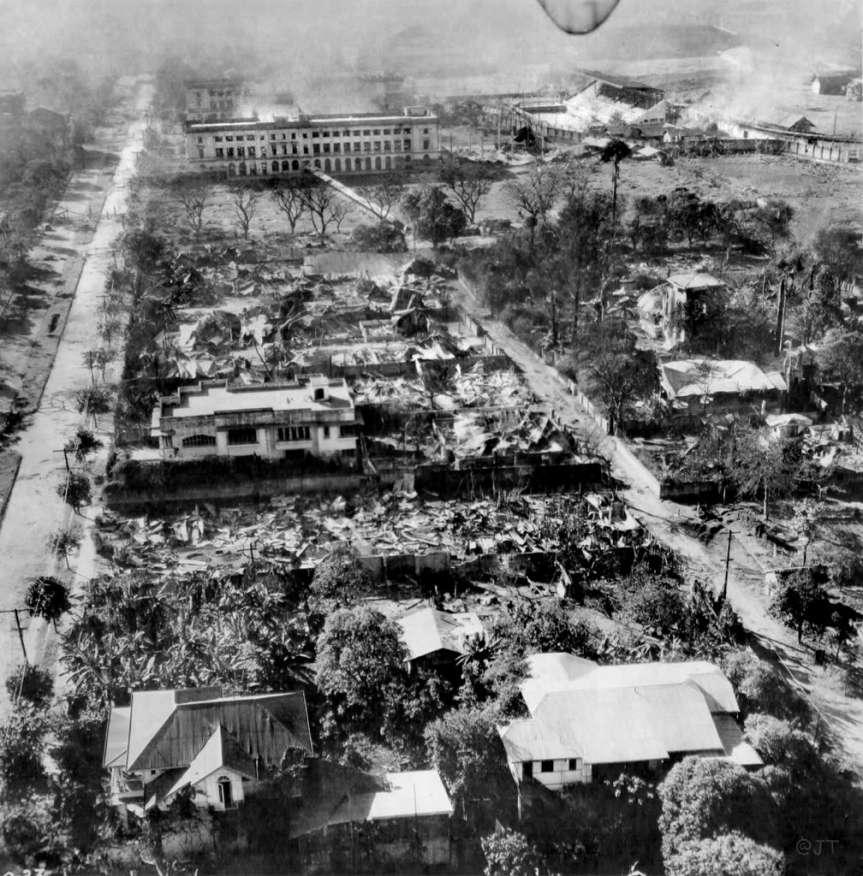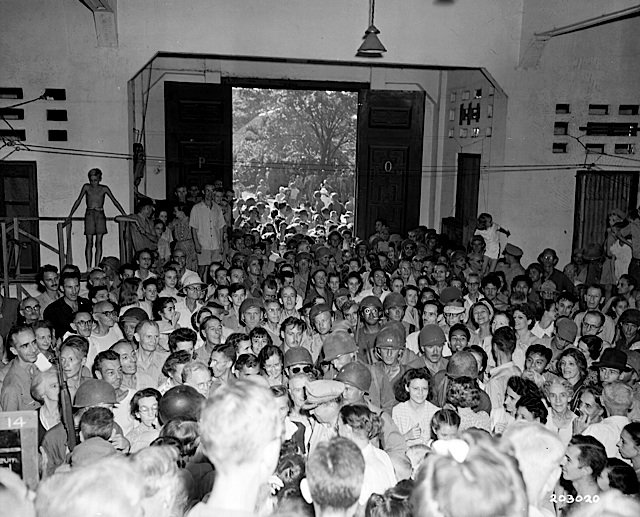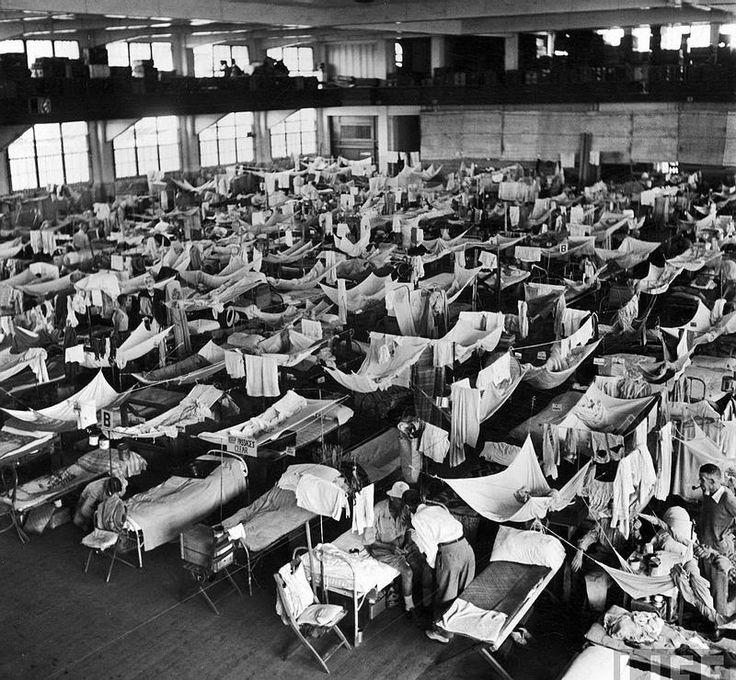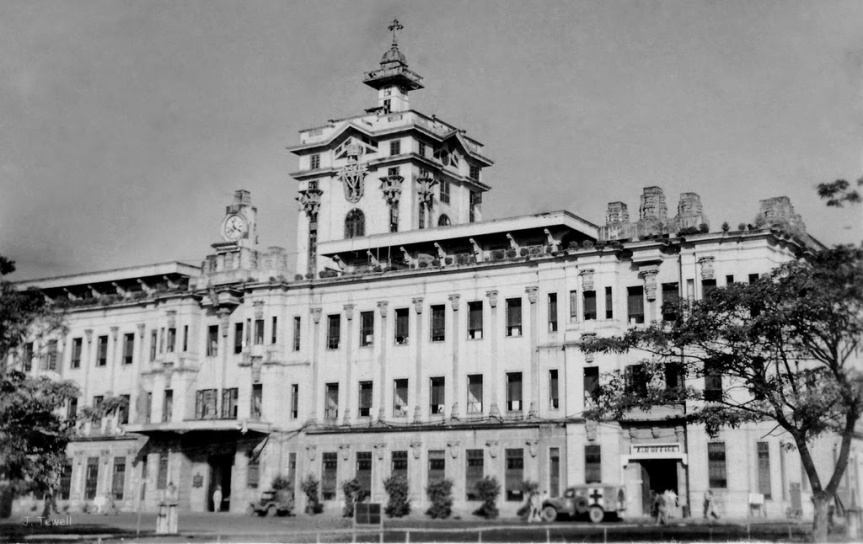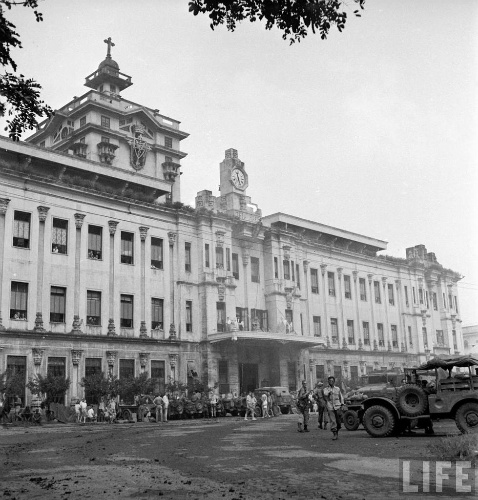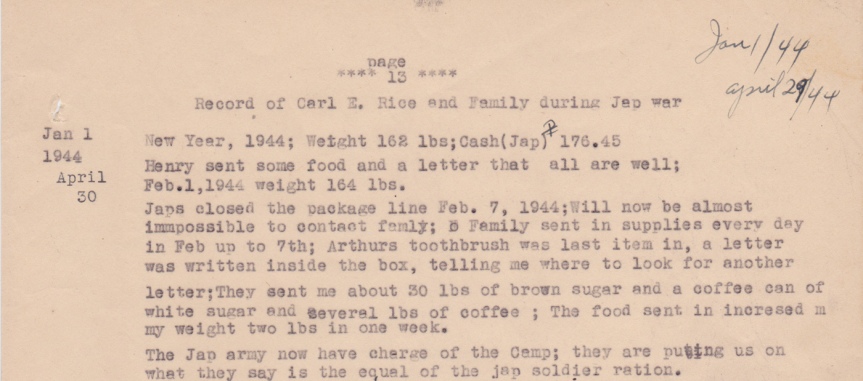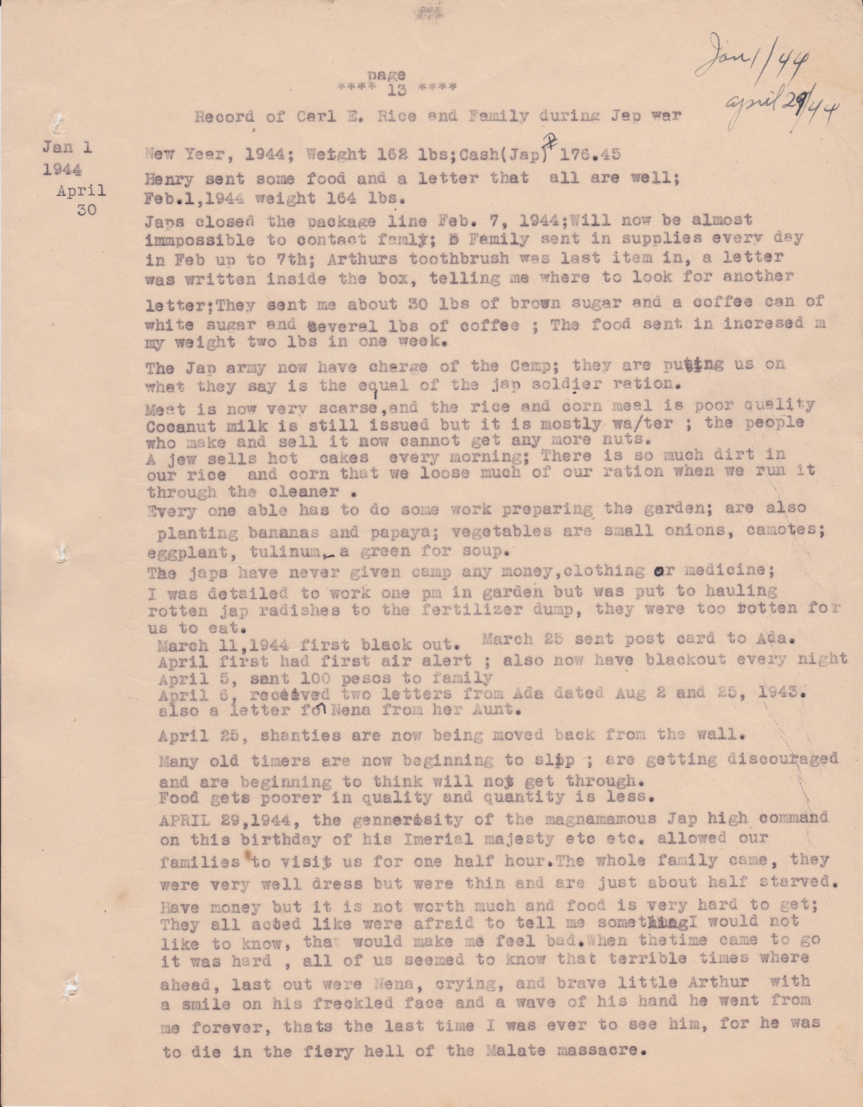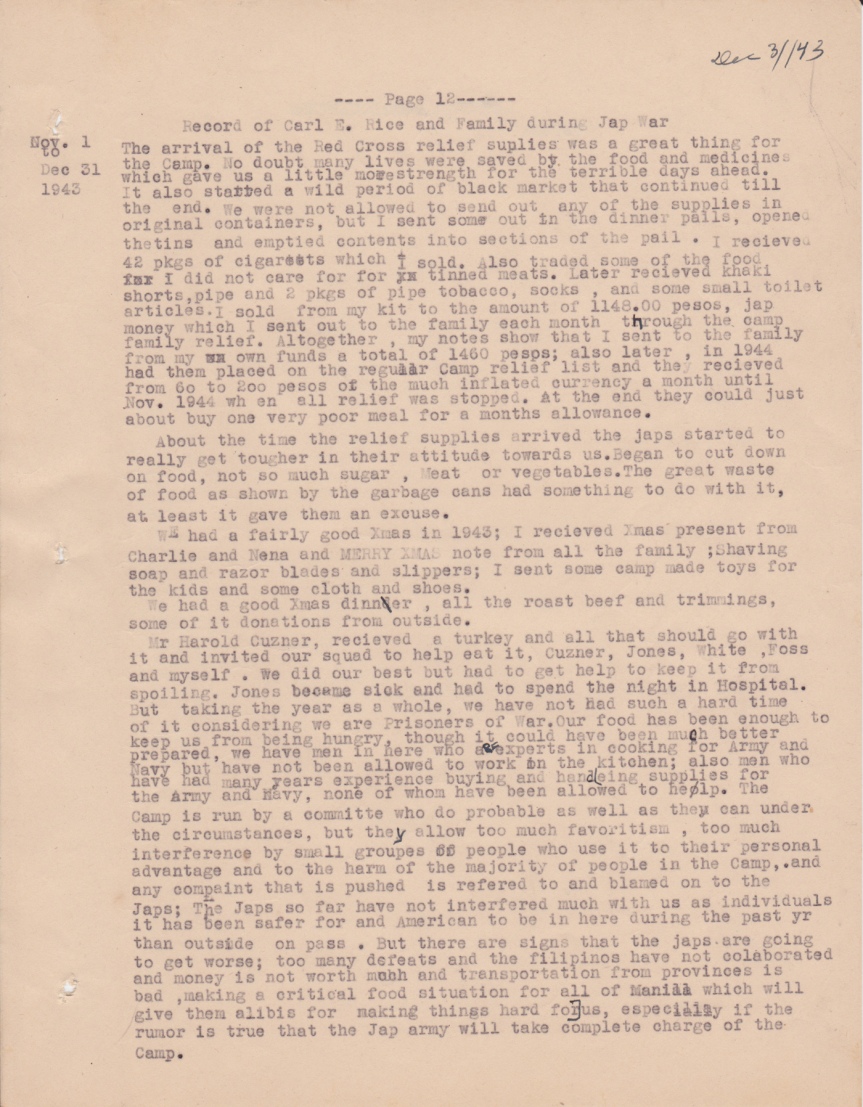Rice Boys are Veterans of Manila Campaign
The Manhattan Mercury, Sunday, June 3rd, 1945
Charles and Henry Rice had planned for years to come to the United States this summer to be with their aunt, Miss Ada Rice of 917 Osage, and to enter Kansas State College this fall. They arrived almost a month ago, but under different situations from what they had anticipated. The boys, 18 and 17 respectively, are veterans of the Japanese occupation of Manila and of the American capture of the city this spring.
The father of the two boys, Carl E. Rice (my grandfather), and their mother (Maria), two sisters (Ellen and Norma) and a brother (my Dad) are also coming to America, and may be on the ocean now (actually not for another two months). Mr. Rice was sent to the Philippines when he was 20 in the Spanish-American War, and has been there ever since.
The American Push
The Rice family lived in the Malate district of south Manila near the University of the Philippines. In February of this year when the Japs began to feel the American push, they started driving through Manila from the north and east. The Japs crossed the Pasig River which runs through the heart of the great city, and burned all the bridges.
They ravaged the business and residential districts, burning everything they could. The newer buildings of concrete were still standing after they left, but were full of shell holes and burned out inside. According to the boys, the residential sections fared worst, especially in districts where the houses were all of frame construction.
Churches were transformed into munition dumps, the pillboxes were converted from all sorts of buildings. The Japs had holes dug in the streets for mines but hadn’t put the dynamite in them yet when the Americans arrived.
Then came the house to house burning in the Malate district. One morning about two o’clock the Rice family awoke with fire on three sides of their house. Grabbing food and a few belongings which had been packed in anticipation of such an event, the family ran out of the back door and into a vacant lot where the fire could not reach them. They dug foxholes and tried to get everyone in them, but hundreds of people were gathering there for safety.
Two Killed
The Japs were pumping bullets right and left as well as lighting more fires. It was then that the 14-year old brother of the boys (Arthur) and their maternal grandmother (Anding) were killed by artillery barrage.
For five days and nights the group existed with little or no food. They were under heavy overhead artillery barrage between the Jap stronghold south of their home and the Santo Tomas camp in the northern part of the city which had been captured by the Americans.
Charles, the eldest son, left the family, saying that if he hadn’t returned in half an hour for them to follow him. He was to try to steal his way to the north and meet the American forces, but he had no idea whether he would run into Japs or Americans.
A Turkey Dinner
Two days after he left the family, he arrived at the camp with but one shrapnel wound. Three days later the rest of the family arrived. Charles said that after not eating for five days and five nights, constantly dodging snipers and artillery, it seemed funny for him to arrive at Santo Tomas and be given a turkey dinner.
Within 18 to 21 days Manila was fairly well cleaned out by the Americans, and within a month even the walled city pocket, a downtown business section, was cleared.
Charles and Henry were at Santo Tomas camp for one month before sailing for Los Angeles. During that time Charles gained 25 pounds and Henry 17. During the Japanese occupation of Manila Charles grew in height from 5 feet 2 inches to 5 feet 8 inches and Henry from 4 feet 8 inches to 5 feet 5 inches.
Conditions in the camp after the Americans had taken over were wonderful, according to the boys. They saw movies straight from American production lots. They were amused when they got to Los Angeles and went to the movies to see the shows in Manila were billed in Los Angeles as coming attractions.
Japs Intern Their Father
Back in January of 1942, all the men in Manila were picked up. Carl E. Rice, the father of the boys, was picked up on January 3 and released the same day. On January 5 he was again taken to Santo Tomas camp, and released within two weeks with the understanding that he was to report back to camp every three months.
In April of 1943, he was again put into the camp when the Japs called back all the older and ill men. This time he was kept there until liberated by the Americans this February. The Japs had planned that all the men in the camp over 15 would be shot on February 4, but on February 3 they were liberated by the American First Cavalry.
Their father weighed 180 pounds when he entered the Santo Tomas camp, and weighed only 128 when he was liberated. During the first month after his liberation he gained 20 pounds and is beginning to straighten up, say his sons. For a time Charles was taller than his father, because he was so bent over, but now his father is almost back to his original height of almost 6 foot.
The Japanese army personnel were fat, as were the guards at the camp—“fat and insulting,” as Charles put it. Civilians were thin and undernourished.
Red Cross food packages were distributed to Japanese officers, and quiet frequently the Jap soldiers were issued American cigarettes and sold them to the internees and prisoners of war for American money. Food prices, when food was available and anyone could buy it, doubled within a week, then doubled again the next week.
POWs Beaten
“The prisoners of war were beaten, tortured and kicked around like dogs,” according to Charles and Henry. They were not given any clothes at all, there was no meat, no bread, no corn for them—just a little rice. All the high American officers, especially aviation officers, were taken to Japan.
The Santo Tomas camp was a little city within itself—with a hospital, police, KP, garbage detail—about fifty acres in all. The first year of imprisonment in the camp was lots of fun, the boys said. There were organized games, football, and school went on as usual. Had the boys been in the camp they might have completed two more years of schooling, because all of the best American teachers were interned there. During the last year or so, however, few of the children tried to go to school because it took too much precious energy to climb to the fourth floor. Food was scarce, and energy was not to be wasted.
For propaganda purposes one elementary school was opened, Japanese teachers were brought there who taught the Japanese language. Pictures were taken of the school and used to show what good treatment the children of Manila were given in Japanese hands.
Japanese Propaganda
All the news that the people of Manila got during the period of Japanese occupation was through the Japanese Propaganda Agency. They always admitted landing, but played down losses. They made much of Nazi rocket bombs, and according to the agency, the Germans never retreated—they just withdrew to new lines.
All the short wave attachments in the city were removed several years ago, but a few showed up later. When good news from elsewhere was heard via these radios, it was spread by the grapevine system all over the city.
The boys confirmed the opinion of many regarding Japanese warfare. They say that their strength depends on numbers, not on strategy. “They are fanatical and will hold out in numbers no matter what the cost, but they are not much good on tactics. They’re just like rats, and even a rat is hard to kill.”
Both Charles and Henry admire the Jap machine gun and knee mortar, but say that their tanks are no good and that their 25 caliber rifles will not compare to the American 30 caliber.
They Like America
When asked if America was what he thought it would be, Henry grinned and exclaimed, “More!”. Charles said he was surprised that Manhattan is this large, because when they were coming through Utah and Wyoming the time table would list a city in large print and then there would be but fifty buildings in the whole town. Both say that Manila is quite like the United States except for the weather.
Charles speaks three languages, English, Spanish, which he learned from associated with the Spaniards in Manila, and Tagalog, the native language which they both learned during the past few years.
Charles is interested in radio or aviation, but Henry hasn’t decided what he’d like to take up yet. Since both boys were freshmen in high school when Pearl Harbor was bombed and they have not attended school since, they are catching up by going to summer school at the high school. They hope to enter Kansas State College as soon as possible.
In referring to their experiences of the past few years, the boys say, “I don’t see how we got through it all,” but are very happy to be in the United States and they intend to remain here “forever”.

